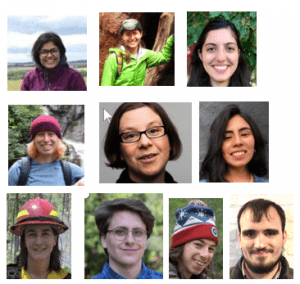Job Announcements
Job Announcements as of 8 October 2018:
Graduate opportunity in the Precision Forestry Cooperative University of Washington, School of Environmental and Forest Sciences (UW- SEFS)
The Precision Forestry Cooperative (PFC) in the School of Environmental and Forest Resources at the University of Washington is seeking a MS student who is enthusiastic about using state-of-the-art airborne remote sensing technologies and in situ data to study forest ecology and sustainable management. This two-year funded position will be joining a collaboration between UW and the USDA Forest Service Pacific Northwest Research Station with strong collaborations with other Forest Service scientists and managers as well as other NASA and academic researchers. The research program will be centered around two projects: 1) Assess the spatial distribution and condition of woody shrub vegetation in the boreal ecosystems of interior Alaska. Alder and willow species in interior Alaska can grow to the size of small trees (≥10 cm DBH), and they are often the first colonizers of disturbed land, adding both carbon and nitrogen (in the case of N-fixing alder) to build soils for future forests. This study will investigate how airborne laser scanning and hyperspectral imaging data can be used in combination with a network of forest inventory measurements to quantify the biomass/carbon contained in woody shrubs over a large portion of Alaska. The scope of this thesis project includes the full research cycle, including several weeks of field data collection in south-central Alaska, data processing, data analysis and reporting the findings in a scientific journal. 2) Use remote sensing data, especially airborne lidar, to study forest conditions across substantial areas of one or more national forests to assess their resilience to disturbance processes such as fire and drought/insects and to develop management options for improving resilience.
Due to the intensive data processing and analytical requirements of the project, the applicant is expected to have demonstrated strong statistical skills and have experience with programming in R, Python, Java, or C++.
The ideal candidate will have experience in several (but interest in all!) of the following areas:
• BS or MS degree in biology, ecology, forestry, environmental science, or engineering
• Ecological field work experience lasting several weeks including forestry measurements (e.g., tree size, diameter, allometrics, stem mapping)
• Forest remote sensing experience especially with airborne and terrestrial lidar and hyperspectral data
• Demonstrated quantitative skills (e.g., general statistics, linear modeling, spatial statistics)
• Demonstrated computer programming skills (Python, R, etc.)
• Botanical knowledge of major trees, shrubs, and herbs in interior Alaska
• Two or more years of work experience following BS degree
***** This position will ideally start in the spring of 2019 to prep for the summer 2019 field season, but the student will need to start in the summer 2019 field season at the latest. For more information on Dr. Kane’s lab, UW’s Precision Forestry Cooperative, and the Pacific Northwest Research Station’s remote sensing lab, please visit: https://sites.uw.edu/vkane https://sites.uw.edu/uwpfc/ https://www.fs.fed.us/pnw/rma/
How to apply:
Send an email to Dr. Van R. Kane at kanefrl@uw.edu no later than October 30, 2018.
The subject must include the words, “PFC 2018 student search”. The body of the email must include a short paragraph or bullet points summarizing your experience for each of these points: undergraduate and any additional degrees, forest ecology experience, field work experience, remote sensing experience, quantitative analysis experience, and computer programming experience. Interested students are requested to create a single PDF document which contains the following: • A one-page statement that demonstrates (a) how your experience prepares you for this project, (b) which aspects of the project interest you most, and (c) your career goals after grad school. • A current CV • Unofficial undergrad (and grad if applicable) transcripts • Unofficial GRE scores and percentiles (taken within the last five years) • List of three references (name, position, institution, email address, and phone number). <<References will not be contacted until after the formal application process at UW.>> Dr. Kane will contact the top candidates to schedule a skype conversation in mid-November, and then encourage the top few candidates to apply to UW- SEFS by the application deadline of Dec 1, 2018.

